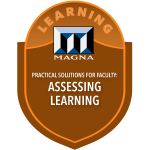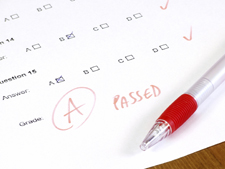Description
Earn this badge

Learn more about how badging works at Magna
“I was searching for a cohesive set of instruction on a particular topic, in this case on learning assessment. This offering was a perfect fit. I appreciated the structure of the learning and the expertise of the instructors.”
Rebecca PilleAdjunct Associate Professor, Maryland University of Integrative Health
“I came away with some ideas that I can utilize in any class.”
Lynn Ulatowski, PhDAssistant Professor, Ursuline College
Previous
Next
Assessing student learning is an essential part of any college-level class, yet it can be stressful for students and time consuming for faculty. Assessing learning is not just about giving students an exam. It’s about measuring learning throughout the course, helping students retain course content as they learn it, and providing meaningful and valuable feedback on assignments and exams.
Practical Solutions for Faculty: Assessing Learning is your guide to helping students succeed through meaningful assignments, well-written assessments, and thought-provoking feedback.
Practical Solutions for Faculty: Assessing Learning is an asynchronous 8.5 hour course that begins with strategies to create a culture of excellence and foster intrinsic motivation. You’ll also be introduced to teaching practices directed to improving cognition and retention as well as guidance in creating assignments and exams to assess learning. Finally, you’ll receive proven advice on not only simplifying the grading process, but also how to maximize feedback to impact learning.
This asynchronous course also features transcripts, note-taking guides, supplementary materials, and regular assessments to enhance your learning, as well as a certificate of completion at the end of the course.
Help students master your content! Learn from your brilliant colleagues who have been there before and get the tools to succeed with Practical Solutions for Faculty: Assessing Learning!
Learning Goals
After completing this course, you’ll be able to:
- Customize academic-integrity strategies to the discipline taught and level of rigor expected of learners
- Incorporate frequent, low-stakes assessments that will create deeper learning and increase student self-efficacy, thereby reducing the incentive to cheat
- Create multiple-choice questions that effectively target different cognitive levels
- Understand assessment as a holistic, transformative, and authentic means to enhance student learning
- Optimize feedback provided to students while being strategic about the time invested in grading
- Improve the effectiveness of standardized testing by re-conceptualizing the post-exam review into a powerful teaching and learning tool
Who Will Benefit from This Course:
- Faculty
- Educational Developers
- Instructional Designers
Group Enrollment:
Discount pricing is available for multiple seats purchased at the same time.
For 10 or more seats, please contact Magna Sales at sales@magnapubs.com or call 800-433-0499 ext. 183 to receive a customized quote.
Product Code: PO22IA
Meet Your Presenters
Ken Alford, PhD
Professor of Church History and Doctrine, Brigham Young University
Oliver Dreon, PhD
Professor, Millersville University of Pennsylvania
Lauren Hays, PhD
Assistant Professor of Educational Technology, University of Central Missouri
James M. Lang, PhD
Professor of English & Director of the Center for Teaching Excellence, Assumption College
Maria Marconi, EdD, RN, CNE
Assistant Professor of Nursing, University of Rochester
Wren Mills, PhD
Pedagogical Assistant Professor, Western Kentucky University
Amy B. Mulnix, PhD
Director of the Faculty Center, Franklin and Marshall College
Gary Pavela, JD
Faculty, Syracuse University
Danielle Schwinn
Instructional Design and Technology Consultant, Central Community College
Jim Sibley
Director, Faculty of Applied Science, University of British Columbia
Michael G. Strawser, PhD
Assistant Professor and Founder, Legacy Communication Training and Consulting LLC
Thomas Tobin, PhD
Program Area Director, University of Wisconsin-Madison
Maryellen Weimer, PhD
Professor Emerita, Penn State Berks






